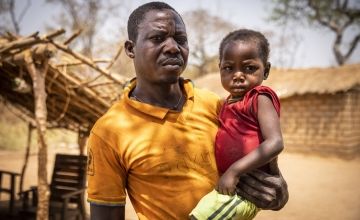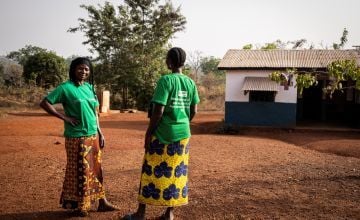
Read our 2023 annual report

Knowledge Hub
The landlocked Central African Republic (CAR) continues to experience a silent, yet severe, humanitarian crisis.
This year has been another difficult year for the Central African Republic, with conflict and the climate crisis just two of the factors that have left almost half of the country's population unable to meet minimum dietary energy needs on a consistent basis.
Millions of people remain vulnerable to food shocks and further crises.
The Global Hunger Index report for 2023 shows that the country's undernourishment rate between 2020 and 2022 was at a rate of 48.7%, the highest in this year's report. CAR is one of six countries with 2023 GHI scores in the 'alarming' range, along with Madagascar, Yemen, Democratic Republic of Congo, Lesotho and Niger.
One child in 10 does not reach his or her fifth birthday in CAR, while 40% of children are stunted and 5.3% of children are wasted.
Conflict continues to affect the country, along with population displacement, widespread poverty and underemployment. These are the main drivers of hunger as we head towards 2024.
Empty state coffers
In such a huge and predominantly rural country, the administration has struggled to deliver essential services such as healthcare for children under five in recent years.
Most hospitals, health centres and posts have needed NGO support to fully function and cover their staff salaries.
As poor road conditions continue to deteriorate in the rainy season, movements are limited, and therefore localised ground solutions and solidarity are vital to compensate for the lack of central funding and access to micro-finance institutions.
Across the Central African Republic, life is getting tougher for those looking to help others, and to make a living themselves.

Nazaire's story
Living standards in Central African Republic have been severely weakened by successive crises, with public and private institutions compromised, as well as the destruction of social and educational infrastructure.
Young people have been particularly badly affected.
Often, they have not yet developed basic skills and, if they have not been integrated into social life, they may become targets for armed militias.
However, there is hope.
The aim of the Agricultural Vocational Training for Unemployed and Internally Displaced Youth project is to make the lives of people between 18 and 35 in the Bangui region more stable - both socially and economically - with a view to reducing migration and crime.
People receive training in several agricultural sectors and, hopefully, go on to start their own businesses.
Nazaire Namkomana recently graduated from the agricultural vocational training centre for poultry farming, having entered in 2019.
He is now in a position where he can generate income.
Being able to ensure his family's food security has changed 29-year-old Nazaire's life.
"Before the training I had to worry about providing for my family; sometimes we didn’t have enough to eat," he says.
"Now my children’s schooling is assured. I had no knowledge of poultry farming or any possibility of practicing it, although I had a passion for the field.
"After the training, I started to run a flock of 50, then 100, then 150 chicks, and I have now ordered 200 chicks."
His goal now is to train other young people.
“My aim is to turn my unit into a large production company so that I can not only look after my family and send my children to top schools but also reduce poverty among young people in my community," he added.
An impressive resilience

Central Africans show an impressive resilience, steadily enduring political coups and a number of civil and social crises.
The population is also extremely young with 78% being under 35, and 50% under 18, meaning a new generation and workforce is coming with new creative ideas.
Since spring 2021, there has been a relative stability nationwide in terms of conflict, following the unrest that arose the previous winter during presidential elections. This means that humanitarian workers have been able to work in more towns and villages throughout the country.
Also, as we reported last year, there have been advances in the speed at which cassava - a staple food within the country - can be grown with improved seeds developed in 2006. Concern had planned to start using it on a new Irish Aid programme in 2023.
The cassava grows within six months, as against the previous 18 months, and can greatly alleviate the impact of the lean season and the response to shocks.
There is hope, as Nazaire has shown, but until the international community starts paying attention to one of the hungriest nations on the planet, there is a long way to go for the Central African people.

Our impact in 2023
people reached through our emergency response
people reached through our health interventions
people reached through our livelihoods programmes

